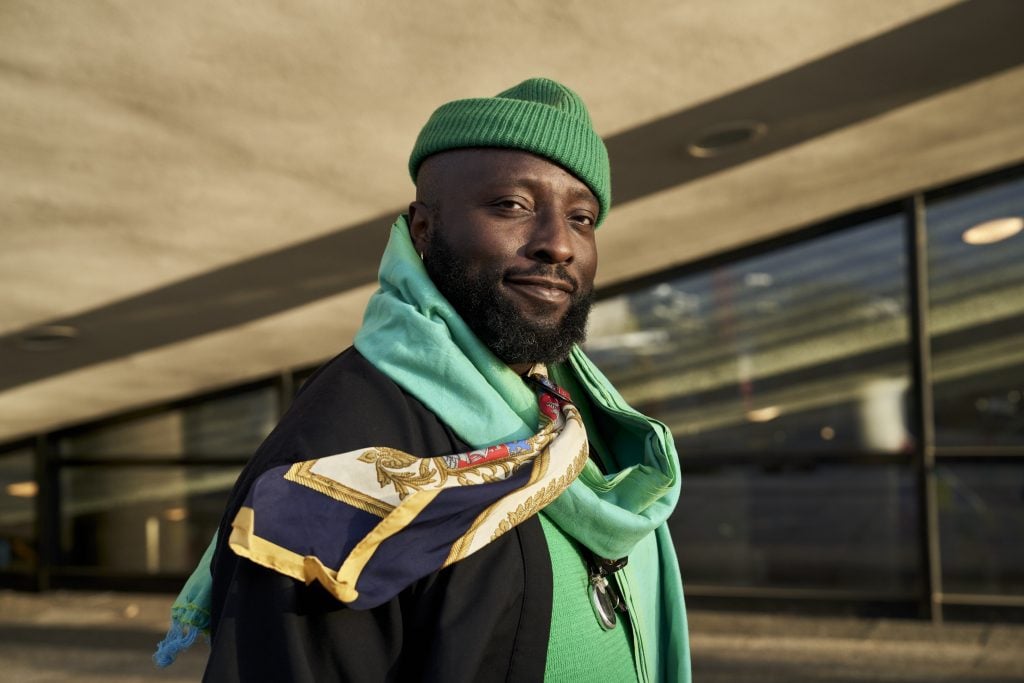Art World
Bonaventure Soh Bejeng Ndikung to Curate 2025 São Paulo Biennial
Bonaventure Soh Bejeng Ndikung has curated major exhibitions from Kassel to Bamako and helms a Berlin museum.

Bonaventure Soh Bejeng Ndikung has curated major exhibitions from Kassel to Bamako and helms a Berlin museum.

Artnet News

Curator Bonaventure Soh Bejeng Ndikung will helm the 36th edition of the São Paulo Biennial, slated for 2025.
The Cameroon-born, Berlin-based curator is nothing if not in demand; he has been director and chief curator at Berlin’s Haus der Kulturen der Welt (HKW) since January 2023; he teaches at the Weißensee Academy of Art Berlin; he was a curator at large at Documenta 14, “Learning from Athens,” in 2017 (helmed by Adam Szymczyk); he served as guest curator at the 2018 Dak’Art Biennale in Senegal; and he was co-curator of the Finnish Pavilion at the Venice Biennale in 2019, and a member of the jury in 2022.
He’s also the artistic director of Sonsbeek20>24, the international contemporary art exhibition that takes place in the Netherlands, and served as artistic director of the “Bamako Encounters” African photography biennale in Mali in 2019 and 2022. To boot, he’s the founding director of the Berlin venue Savvy Contemporary.
“To say that I am happy to be appointed chief curator of Bienal de São Paulo would be an understatement. I am thrilled, honored, and humbled to embark on this journey with a team of co-curators and the brilliant Bienal de São Paulo team led by the foundation’s president Andrea Pinheiro. Bienal de São Paulo is not only one of the oldest and most important biennials in the world, but as one of the very few free-admission biennials, it has proven in the past 73 years to be a biennial of and for the people.”
Ndikung boasts an unconventional background for a curator holding all these high-profile posts: he earned a doctorate in medical biotechnology and did post-doctoral work in biophysics.
“In his curatorial work, Bonaventure Soh Bejeng Ndikung acts as a driving force that challenges boundaries and contributes to shaping the future of global contemporary art,” says Andrea Pinheiro, president of the biennial foundation. I am sure that the 36th Bienal de São Paulo will continue to play its provocative role and be attentive to current issues, continuing the developments brought about by our most recent editions.”
Artnet’s Ben Davis, reviewing the 2018 edition of the show, led by Gabriel Pérez-Barreiro, called the show “a biennial of deliberately and provocatively small claims,” while Tiago Gualberto observed that the goal of the 2021 edition (led by Jacopo Crivelli Visconti, Paulo Myada, Carla Zaccagnini, Francesco Stocchi, and Ruth Estévez) was, in part, “to reactivate cultural and artistic institutions in the city in a massive and expansive way” in the face of major challenges to public institutions.
“Despite the challenges that biennials are facing around the world, they still serve as important barometers for measuring the sociopolitical pressures of the world,” said Ndikung. “The Bienal de São Paulo seems to me to be a seismograph that not only records the different tremblements the world is experiencing socioeconomically, geopolitically and environmentally, but these records also give us the possibilities of shaping a more just, humanitarian future for all animate and inanimate beings on this planet. I am not only looking forward to continuing my long-term research in Abya Yala at large and Brazil in particular, but also to connecting my current practices as director, pedagogue, and curator across geographies.”